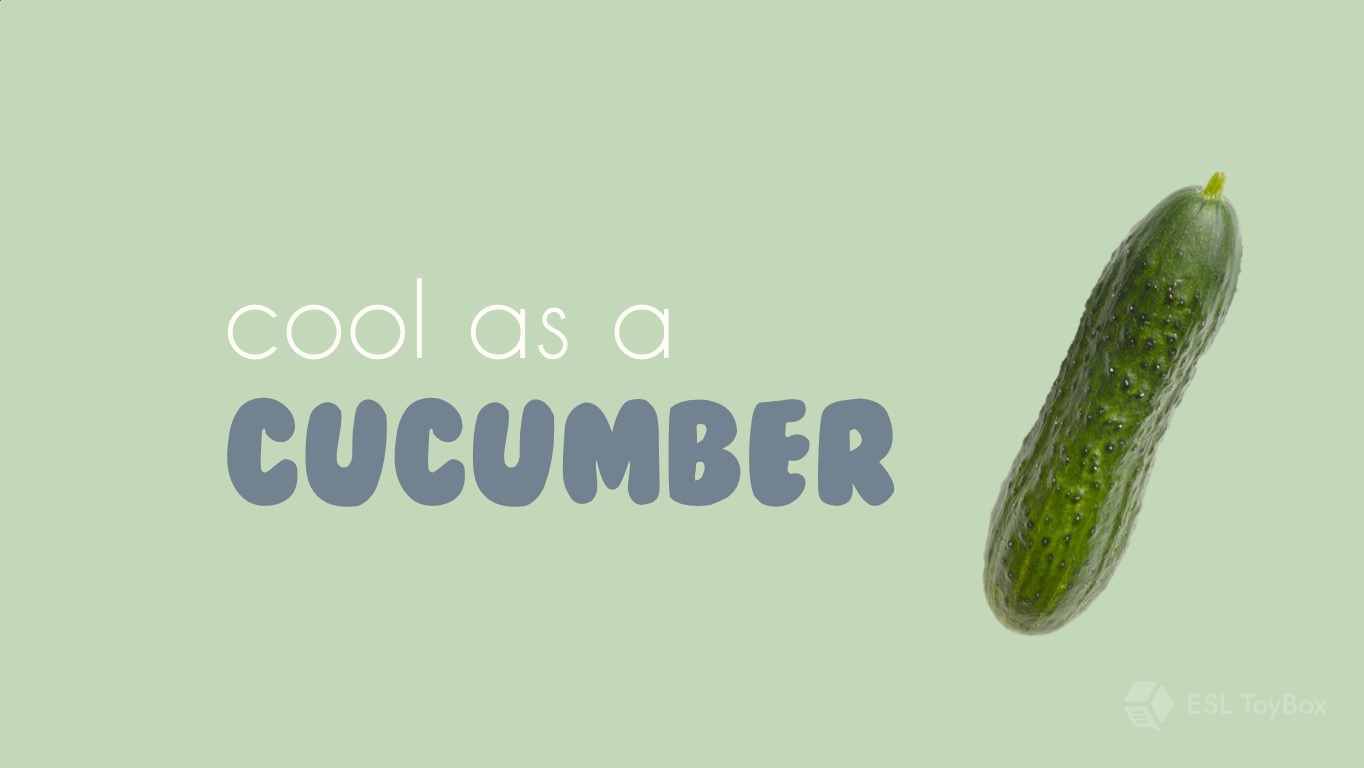Cool as a Cucumber
The phrase, cool as a cucumber came up at work today and it is a phrase that I have wanted to investigate. There is a belief that cucumbers are actually cooler than the air around them. It is something that I’ve heard before, so I shared that with my coworkers. One of them didn’t believe me and looked it up to find that it is indeed true. However, I have always been skeptical of that claim. It sounds like an old wife’s tale to me. So, today I decided to look into it. But first, lets explore what it means.
Meaning and Origin
Cool as a cucumber is a simile that is used as an intensifier. Much like ‘hard as a rock’ and ‘dumb as a doorknob’, today’s phrase is an intensified version of the initiating adjective. That means you can just say cool, hard, or dumb but you can use these phrases add emphasis to what you are saying. A rock is an example of something extremely hard, a doorknob is an example of something without a brain, and cucumber is an example of something that is cool. So, what does cool mean?
When the phrase cool as a cucumber was coined in the early 1600s, it meant that the person was cold and emotionless on the inside. Actually, the phrase was originally, “cold as a cucumber.” Over time, the lack of emotion gained a more positive connotation. The ability to stay calm and emotionless can be a virtue under the right circumstances. So, the term coolheaded came to mean a person who can stay calm under pressure (18th century). Coolheaded can still be used, but ‘headed’ is usually dropped and the word cool is used to describe a calm and relaxed person. The “as a cucumber” part is just there to intensify the calm nature of the person.
Example: Even though he was surrounded by wolves, he never broke a sweat. He was as cool as a cucumber.
Are Cucumbers Cool?
So, are cucumbers really cooler than the outside air or is it just a myth? Well, it’s a little complicated. There are a lot of websites that make the claim that a cucumber can be up to 20 degrees cooler on the inside. Even if we assume that is 20 Fahrenheit, that is still a very large temperature discrepancy. The references are either not there or point to a webpage that doesn’t exist anymore. Using the wayback machine, the webpage doesn’t even talk about cucumbers. It also seems unlikely because it is basically just water with a coating. Warm-blooded animals can stay warm because we have internal organs and mechanisms actively regulating our heat. Cucumbers do not have this ability. Some suggest that the high volume of water makes cucumbers more resistant to changes in temperatures. This does seem to be the case if I am reading the article about blanching correctly. But it doesn’t seem likely that cucumbers are actively cooling themselves.
It may be that people who eat cucumbers feel physically cool. The high-water content surely helps with sweating, and it is important to stay hydrated. This has been suggested as the reason behind the phrase, but I think it is unlikely as the original phrase implies that the cucumber is physically cold. It seems more likely that cucumbers picked in the morning have not warmed up from the summer heat yet and thus seem cool to the touch. Their leaves also protect them from the sun. This would be my suggestion as to why cucumbers are cold.
Do you agree? Let me know what you think in the comments.
See Also: In a Pickle, Old Wives' Tale,
For more English phrases and quotes, follow me on Facebook:
https://www.facebook.com/ESL-ToyBox-112152010890485
Reference:
https://culinarylore.com/food-history:are-cucumbers-really-cold/
https://www.etymonline.com/word/cool
https://www.merriam-webster.com/dictionary/coolheaded
https://www.liveeatlearn.com/cucumbers/
https://web.archive.org/web/20160816234345/https://www.choosemyplate.gov/MyPlate
https://www.sciencedirect.com/science/article/abs/pii/S0260877400001175


